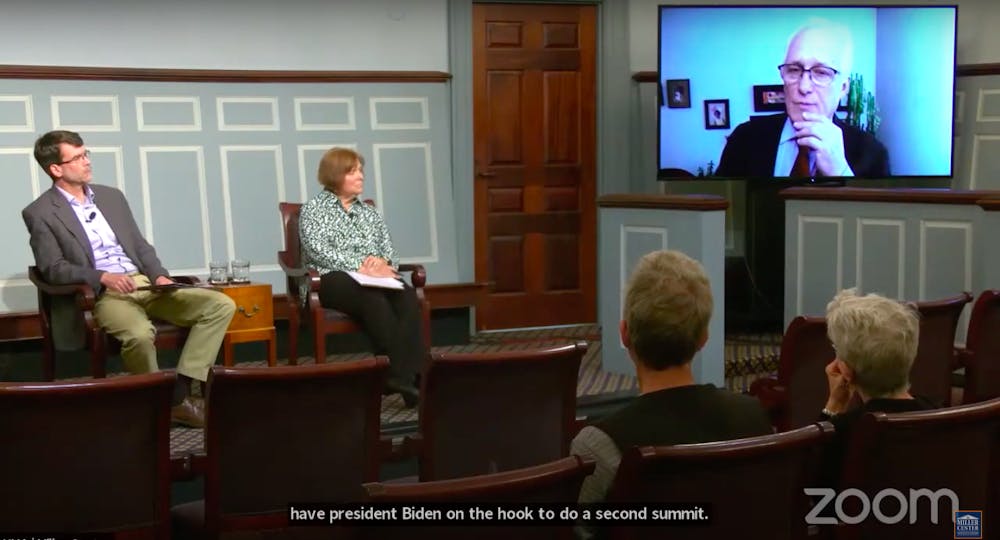A panel of professors and researchers discussed the pandemic’s impact on public health policy Wednesday, the first undertaking of the Miller Center’s Health Care Policy Initiative.
The event included discussion about the legacy of COVID-19 in the U.S., how the Biden administration is dealing with the ongoing pandemic, the relationship between pandemics and foreign policy and how individuals can deal with uncertain public health measures as mask mandates are lifted around the country.
The initiative is co-directed by Guian McKee, associate professor in presidential studies at the Miller Center, and Law Prof. Margaret Riley The center will focus on issues related to the structure and operation of the healthcare system both in the U.S. and globally, paying special attention to how health policy and pandemics impact global security.
The event began with a discussion of the changing nature of mask mandates and how the status of mask requirements will change in the coming weeks.
J. Stephen Morrison, senior vice president at the Center for Strategic and International Studies, said that he does not believe mask mandates to be a thing of the past because of the continued possibility of a new variant of COVID-19 emerging.
“People are saying mandates are over, I think that's too premature [a] judgment,” Morrison said. “I don't think we're done with mandates and masking in the future when we hit dangerous situations.”
Riley emphasized the interconnectedness of mask mandates and booster shots for COVID-19 as pandemic prevention measures. On Tuesday, the Centers for Disease Control and Prevention recommended a fourth booster shot for immunocompromised people and those over 50.
Riley said an additional booster shot can be helpful in protecting individuals vulnerable to COVID-19, especially as many schools — including the University — have lifted mask mandates.
“Even if we're in a situation where — as we're seeing states eliminating mask mandates and schools etc., eliminating mask mandates in all sorts of contexts — [and as] all the other mitigation pieces are disappearing, [the booster] at least protects probably from hospitalization,” Riley said.
Morrison detailed the overwhelmingly negative impact of the pandemic on the nation, as total fatalities approach one million. Additionally, questions linger surrounding the unknown effects of “long COVID,” a term that refers to any new or returning health conditions that occur because an individual contracts COVID-19.
Riley expressed positivity regarding the rapidity with which COVID-19 precaution measures were established, particularly the accomplishments of scientists who developed vaccines.
“We actually managed to produce vaccines — and not just produce the vaccine template but actually produce the vaccines — in a year's time, and that's an amazing accomplishment and not one we should forget,” Riley said.
The panel briefly discussed President Joe Biden’s decision to extend the national emergency declaration for the COVID-19 pandemic beyond March 1, with no specified end date. Amidst this decision, there has been some advocacy from senators to end the emergency declaration.
Morrison expressed concerns about misinformation around COVID-19 and explained the importance of transparent and clear communication about the pandemic.
“A lot of the misinformation efforts have gained greater momentum, and they've shifted to a freedom agenda and they've attracted multiple other streams of mobilization behind them,” Morrison said. “It just further reveals the need for a systematic rethink around how to communicate in this period where this has become such a deep problem and it's not going away.”
The panel concluded the event by talking about the international ramifications of a pandemic and what the past two years have meant for global public health and security.
Per Morrison, the recent invasion of Ukraine by Russia further complicates this issue, bringing in the possibility of hardening a political line between the U.S., Russia and China. Further, Riley explained that refugee crises — like the one now occurring as a result of the conflict— often lead to exacerbated public health crises.
“One help is that the Ukrainian population has been vaccinated,” Riley said. “Having said that, we'll still have a public health disaster. Even if we didn't have a pandemic, we would have public health disasters that go along with refugee situations.”
The next event hosted by the Health Care Policy Initiative will be held April 18 and will focus on a book written by Associate Media Studies Prof. Elizabeth Ellcessor about emergency technologies, crises and inequality.







